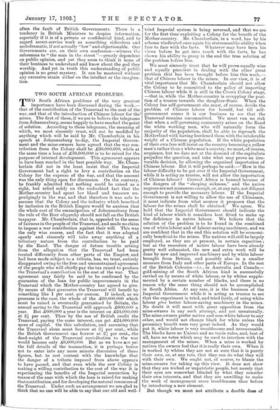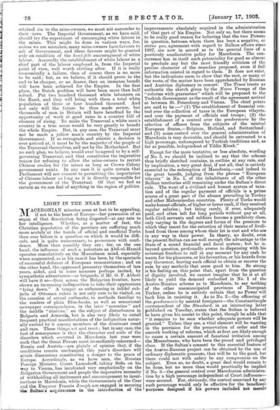TWO SOUTH AFRICAN PROBLEMS. T WO South African problems of the
very greatest importance have been discussed during the week,— that of the contribution of the Transvaal to the cost of the war, and that of the introduction of Chinese labour for the mines. The first of these, if we are to believe the telegrams from Johannesburg, seems happily to have reached the point of solution. According to these telegrams, the meaning of which, we most sincerely trust, will not be modified by anything which will be said by Mr. Chamberlain in his which, we most sincerely trust, will not be modified by anything which will be said by Mr. Chamberlain in his speech at Johannesburg to-day, the Imperial Govern- ment and the mine-owners have agreed that the war con- tribution from the Colony shall be £30,000,000, while at the same time a loan of £30,000,000 is to be raised for the purpose of internal development. This agreement appears to have been reached in the best possible way. Mr. Cham- berlain did not in the least insist that the Imperial Government had a right to levy a contribution on the Colony for the expense of the war, and that the amount was the only thing open for discussion. On the contrary, he frankly admitted that nothing could be raised as a right, but relied solely on the undoubted fact that the Mother-country had spent her blood and treasure un- grudgingly in the war, and that therefore it was safe to assume that the Colony and the industry which benefited by inclusion in the British Empire would be anxious that the whole cost of the emancipation of Johannesburg from the rule of the Boer oligarchy should not fall on the British taxpayer. Mr. Chamberlain, that is, appealed to the sense of fairness in the people of the Transvaal, and made no claim to impose a war contribution against their will. This was the only wise course, and the fact that it was adopted openly and sincerely will take away anything of a tributary nature from the contribution to be paid by the Rand. The danger of future trouble arising from the allegation that the Transvaal had been treated differently from other parts of the Empire', and had been made subject to a tribute, has, we trust, entirely disappeared owing to the free and unconstrained agreement of the people who will chiefly pay the tax raised to produce the Transvaal's contribution to the cost of the war. That agreement may fairly be said to be confirmed by the guarantee of the loan for public improvements in the Transvaal which the Mother-country has agreed to give.
By means of that guarantee the Transvaal will benefit by something like 1 per cent. per annum. If indeed, as we presume is the case, the whole of the £60,000,000 which must be raised is eventually guaranteed by Britain, the annual saving to the Transvaal will approach £600,000 a year. But £600,000 a year is the interest on £24,000,000 at 21 per cent. Thus by the use of British credit the Transvaal, paying the same interest, can get £24,000,000 more of capital. On this calculation, and assuming that the Transvaal alone must borrow at 31 per cent., while the British Government can borrow at 24 per cent., the dead-weight of the Transvaal contribution to the war would become only £6,000,000. But as we have not yet the full details of the transaction, it is perhaps better not to enter into any more minute discussion of these figures, but to rest content with the knowledge that the danger of a tribute imposed from above appears to have passed, and that even while the new Colony is making a willing contribution to the cost of the war it is experiencing the benefits of the Imperial connection by reason of the ease with which the loan is raised for making thatcontribution, and for developing the natural resources of the Transvaal. Under such an arrangement we are glad to think that no one will be able to say that our old and well- tried Imperial system is being reversed, and that we are for the first time exploiting a Colony for the benefit of the Mother-country. Mr. Chamberlain, in a word, has by his scheme vindicated once again his statesmanlike ability when face to face with the facts. Whatever may have been his views before he got into touch with the facts, he has shown his ability to grasp in the end the true solution of the problem before him.
We most sincerely trust that he will prove equally wise and equally prescient in dealing with the other great problem that has been brought before him this week,— that of Chinese labour in the mines. In our view, it is of vital importance that Mr. Chamberlain should not allow the Colony to be committed to the policy of importing Chinese labour while it is still in the Crown Colony stage, —that is, while the Mother-country is occupying the posi- tion of a trustee towards the daughter-State. When the Colony has self-government she must, of course, decide the problem of Chinese labour for herself, but till self- government comes it is our business to see that the Transvaal remains uncommitted. We must run no risk that when a self-governing community arises on the Rand the white working men, who will naturally form the majority of the population, shall be able to reproach the Motherland with having burdened them with the intolerable weight of a Chinese population. If the white population of their own free will insist on the country becoming a yellow man's rather than a white man's country, we must, of course, acquiesce, but we dare not at the demand of the capitalists prejudice the question, and take what may prove an irre- vocable decision, by allowing the organised importation of Chinese labour. But it will perhaps be said:—` How is the labour difficulty to be got over if the Imperial Government, while it is acting as trustee, will not allow the importation of Chinese labour? Central Africa is banned because of the dangers of the "sleeping sickness," and the native negroes are not numerous enough, or, at any rate, not diligent enough to provide the necessary labour. If the Imperial Government is not willing to allow the use of Chinamen, it must indicate from what sources it proposes that the labour for the mines shall be obtained.' We agree. We hold that the Imperial Government should indicate the kind of labour which it considers best fitted to make up the deficiency in native labour. We believe that the solution of the problem is to be found in the combined use of white labour and of labour-saving machinery, and we are confident that in the end this solution will be economi- cally beneficial to the mines. The natives will still be largely employed, as they are at present, in certain capacities ; but as the resources of native labour have been already pretty well exhausted, the new and extra work will be done by new and improved machinery and by white labour brought from Britain, and possibly also in a smaller measure from Italy and other parts of Europe. In the rest of the British Colonies—i.e., in Australia and Canada- gold-mining of the South African kind is successfully carried on by means of white labour, or by whites supple- mented by a certain number of blacks, and there is no reason why the same thing should not be accomplished in South Africa. At any rate, it is the business of the Imperial Government while it is acting as trustee to see that the experiment is tried, and tried fairly, of using white labour plus better labour-saving machinery in the mines. No doubt it will meet with great opposition from the mine-owners in any such attempt, and not unnaturally. The mine-owners prefer native and non-white labour to any other, and would not change black for white unless the pecuniary benefit were very great indeed. As they would put it, white labour is very troublesome and unreasonable. The blacks have no Unions and no trade rules, and, best of all, have no votes which may be used to interfere with the management of the mines. When a mine is worked by natives the owners feel that it is really their own. When it is worked by whites they are not so sure that it is purely their own, or, at any rate, that they can do what they will with their own. We ought not, of course, to blame the mine-owners for taking up this view. It does not show that they are wicked or unpatriotic people, but merely that their eyes are somewhat blinded by what they consider their own interests, and that they are unwilling to make the work of management more troublesome than before by introducing a new element.
But though we must not attribute a double dose of oriainal sin to the mine-owners, We must mit surrender to their iews. The Imperial Government, as we have said, should try the experiment of encouraging white labour in the mines. This might be done in various ways, for, unless we are mistaken, many mine-owners have favours to ask of Government, and these favours might be granted only on condition of the bond-fide encouragment of white labour. Assuredly the establishment of white labour as a chief part of the labour employed is, from the Imperial point of view, well worth striving after. If it is really economically a failure, then of course there is no more to be said ; but, as we believe, if it should prove in the end to be cheaper, or no dearer, then an immense benefit will have been achieved for the Empire. In the first place, the Dutch problem will have been more than half solved. Put two hundred thousand white labourers on the Rand, and they will bring with them a total white population of three or four hundred thousand. And not only will the future be thus made secure, but thousands of men in Britain will have benefited by the opportunity of work at good rates in a country full of chances of rising. To make the Transvaal a white man's country in a true sense would be very greatly to benefit the whole Empire. But, in any case, the Transvaal must not be made a yellow man's country by the Imperial Government. If so retrograde and sinister a decision is ever arrived at, it must be by the majority of the people of the Transvaal themselves, and not by the Motherland. But no such plan, we believe, would ever be agreed to by a self- governing Transvaal, and that constitutes the imperative • reason for refusing to allow the mine-owners to recruit Chinese coolies for the mines as long as Crown Colony government exists. In any case it is quite certain that Parliament will not consent to permitting the importation of Chinese labour as long as it is directly responsible for the government of the Transvaal. Of that we feel as certain as we can feel of anything in the region of politics.











































 Previous page
Previous page